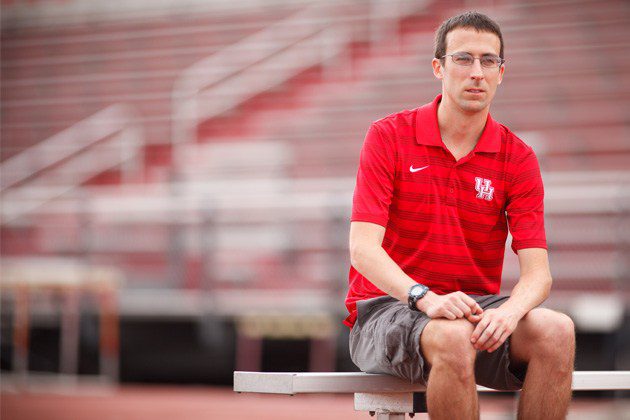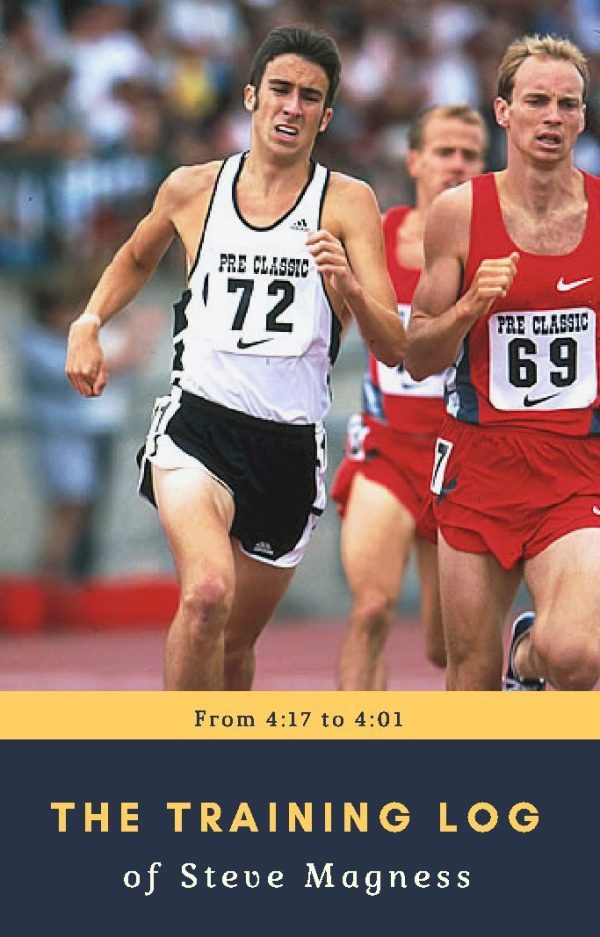Pursuing Your Passion – Q&A with Coach Steve Magness
Coach Development | Mindset// Steve magness on how to use passion to fuel the pursuit of quality and excellence
When Steve Magness was in high school, he was a running phenom who posted a 4:01 mile time that ranked him among the best in the nation. When he realized that he wasn’t going to fulfill his dream of becoming an Olympian, Steve didn’t give up his passion, but rather redirected it into helping other athletes reach their potential. He currently serves as head cross country coach at the University of Houston, lecturer at St. Mary’s University in the UK, and has guided runners to the Olympics, world championships, and top 10 finishes in major marathons.
His first foray into co-writing with frequent Outside contributor Brad Stulberg produced the bestselling book Peak Performance, a playbook for high achievement in sports, work, and life. Their recently released follow-up, The Passion Paradox, explores a topic that’s become a staple of commencement speeches, but is dramatically underserved from both philosophical and practical standpoints. Steve took time before a track meet to discuss some of the central points of his new book, and how they relate to coaching.

Q: Whats the biggest misconception about passion?
Probably that it’s this wonderful thing that we should all either find or follow. We have this idea in our heads that if we just find the thing that we’re really passionate about, then all the other details will work themselves out. And when we fall for that message, what happens is we almost set ourselves up for disappointment and failure because there is often no single one thing that is our true passion in life. The message we were sent from an early age about passion can derail us later on.
Q: As a coach, have you tried to manage your passion so that it doesn't become all consuming?
That’s how this book started out – to look at the role of passion in my life and Brad’s, because we both have this tendency to go all in and become consumed. We’re pushers who want to do big things and get amazing things done. What you find with most successful athletes is that they have a really strong drive and passion for what they do. So with my own coaching, what I try and do is have enough perspective and awareness to understand when I need to be all in and when it’s OK to back off. Where we run into problems is not being passionate or going all in – it’s lacking that ability to step back.
Q: What’s something you do to make that distinction?
I try and set aside periods of self-reflection to keep me on point. Once a week I sit down and ask, “What are my goals?” and “What am I trying to accomplish?” Then I consider if I’m on the right path and if I’m going too far or not far enough. Whether you’re a coach, an athlete, or an entrepreneur, these regular check-ins are incredibly important because sometimes we find that we’ve taken this thing that we’re passionate about so far that it has become toxic. By the time we become obsessive, we might have lost sight of the big picture.
An example we share in the book is Elizabeth Holmes. Her company, Theranos, became everything to her. She dropped out of college for it and put relationships on hold – anything that was necessary to make it seem successful. And in the end, it was her downfall. We see the same with athletes who dope. When someone’s passion runs amok and their identity is completely tied to what they do instead of who they are, it can lead them to a dangerous place.
Q: What’s the difference between that kind of win-now and win-at-all-costs mindset, and a posture of mastery?
Mindset is incredibly important. When all we’re after is short-term gains, we’re more likely to ditch our principles and values and focus on only the results in the moment. Yet those gains may end up hurting us in the long run. Let’s look at a coaching example. If I want someone to run really fast right away, I might overload their training and tell them that if they go hard for a few weeks, they’re going to get really quick. And maybe they get those acute gains and perform well in the next meet. But that approach isn’t sustainable. There’s a cost to it.
On the flip side, if we take this long-term view of instead of worrying about the results right now, we’re focused on doing whatever’s needed to help the athlete grow over the long haul. There’s a greater vision. This will keep someone in the sport for longer and make sure they keep enjoying themselves rather than burning out. It’s also going to get them closer to their optimal potential. It takes years and years to master anything. Examples abound in youth sports particularly. You have these talented kids whose parents are pushing them to train 20 hours a week and they eventually flame out because they specialized too early and there was too much volume. Whereas the kids who dabble in lots of different activities and still have fun on the playground are often those who end up sticking with a sport.

Q: In The Passion Paradox, you mention Robert Pirsig’s concept of Quality, with a capital Q. How does that fit into what we’re talking about today?
Pirsig outlined this concept beautifully in his book Zen and the Art of Motorcycle Maintenance. In a lot of ways, it’s similar to this idea of mastery, with the process being the emphasis rather than on immediate results. There’s this passage where he writes about looking at a building in a new way. If you stare at one brick intently enough, it can become immensely fascinating over time. What he’s saying is that we need to pay attention to the small details and appreciate them.
It’s a perfect illustration of something we struggle with in modern life, which is giving things our full attention and awareness. One of the keys Brad and I have found for people with a mastery mindset is that when they’re focused on doing things that matter, they give it their complete focus. When we’re running around in circles on the track it isn’t boring but rather enthralling when we start to understand all the ins and outs and are mindful of running’s nuances.
Q: One of the things you and Brad wrote that I underlined is, “Whatever you give your attention to is king.” Can you talk about that for a moment?
Sure. We’ve got these gadgets in our pockets that are constantly ringing, buzzing, and beeping. They’re capturing our attention and dragging it away. This leaves us at a superficial level. Think about when you’re out with one group of friends and everyone’s only half-listening because they’re messing around on their phones, and another where everyone’s fully engaged in conversation and is holding eye contact. That second experience is much richer than the first. It’s the same with coaching, writing, or anything else – there’s going to be a dramatic difference in quality when we’re paying attention to what we’re doing and who we’re with.
From a coaching standpoint, I know that when I have my phone out or get too fixated on a stopwatch, it halts life and my observational skills decline. I’m not able to pick up subtle changes in form and mechanics or cues of fatigue. It’s like two different planes of reality. You see that in commentary, too. There’s a big difference between a casual fan watching a football game while he’s eating snacks and talking with his buddies and what Tony Romo’s doing. He has so much experience and is so dialed-in that he can call the plays before they actually happen. We can reach that level in the thing we’re passionate about, but only if we’re willing to pay attention and learn to block out distractions.
Q: Another interesting concept in your book is Aikido master George Leonard’s assertion that we need to spend time on the plateau. What does that mean?
In our modern context, we tend to look for hacks and quick fixes. We put this emphasis on needing to get continuously better every single day and figuring out what the next step is. Improvement and growth are great, but what George Leonard pointed out is that sometimes to get long-term improvements, we need to spend time where we’re at. We’re not necessarily making huge strides every day because progress takes time. We have to be patient because we cannot always get that jump in performance right away.
Data for elite female 5K runners shows that before they made their big breakthrough to the Olympian level, most of their times stagnated for two or three years. Then they saw this huge progression of 15 to 20 seconds that got them to the next level. When a lot of people get stuck on a plateau, they get frustrated and quit. But you have to keep going and putting in the work because you never know when your breakthrough could be just around the corner.
Q: When it comes to living out our passion harmoniously, how important is – as you put it – “the story we tell ourselves about ourselves”?
That’s probably the most important takeaway from the book, because our inner narrative frames how we see the world. If I walk around thinking that the world is against me and is a threatening place, I’ll see all these threats because that’s what my mind is priming me to do. Instead, you need to take control of the story you’re telling. I think in athletics it’s even more important because what often happens is that we intertwine the sport we play with who we are. Over time this can become damaging because if we lose a game or a race, we can extrapolate the result to, “I’m a failure.”
That can become ingrained and hold us back. Research shows that the stories we tell ourselves about winning and losing and how this relates to our identity profoundly impact how we interact with others and our environment. So make sure you’re not handing over your own narrative to others or telling yourself self-destructive things. You need to take control of your story and work on having a constructive inner dialogue that directs you and your passion in positive ways.
Are you a better coach after reading this?
More coaches and athletes than ever are reading the TrainHeroic blog, and it’s our mission to support them with useful training & coaching content. If you found this article useful, please take a moment to share it on social media, engage with the author, and link to this article on your own blog or any forums you post in.
Be Your Best,
TrainHeroic Content Team
HEROIC SOCIAL
HEROIC SOCIAL
TRAINING LAB
Access the latest articles, reviews, and case studies from the top strength and conditioning minds in the TH Training Lab

